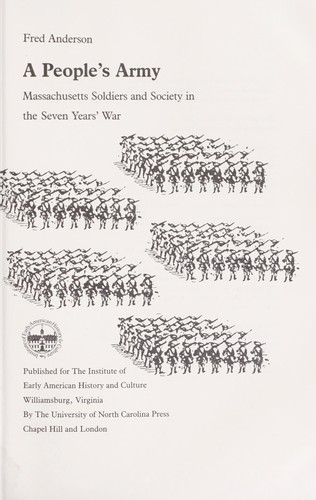Review of "A people's army : Massachusetts soldiers and society in the Seven Years' War" on 'Goodreads'
3 stars
Anderson's A People's Army is an excellent social history of the Massachusetts Provincial militia during the Seven Years' War. The only problem is that Anderson argues for New England exceptionalism by claiming that Puritan Christianity (and especially the concept of a covenant with God) decisively shaped why Mass. men volunteered, choose to fight, and decided to mutiny or desert. Too many of his claims seem less about Puritan-steeped traditions than practical military methods of sustaining morale, helping soldiers cope with battle, and soldiers generally resenting any outside force or authority reneging on the terms of their military service.
He concludes that the Seven Years' War confirmed New Englanders' Puritanical beliefs and also fostered a sense of uniqueness among its veterans. It's clear that chaplains appropriated Puritan doctrine in their sermons to help soldiers comprehend the war's chain of events, and this process probably contributed to a groundswell in renewed Puritan …
Anderson's A People's Army is an excellent social history of the Massachusetts Provincial militia during the Seven Years' War. The only problem is that Anderson argues for New England exceptionalism by claiming that Puritan Christianity (and especially the concept of a covenant with God) decisively shaped why Mass. men volunteered, choose to fight, and decided to mutiny or desert. Too many of his claims seem less about Puritan-steeped traditions than practical military methods of sustaining morale, helping soldiers cope with battle, and soldiers generally resenting any outside force or authority reneging on the terms of their military service.
He concludes that the Seven Years' War confirmed New Englanders' Puritanical beliefs and also fostered a sense of uniqueness among its veterans. It's clear that chaplains appropriated Puritan doctrine in their sermons to help soldiers comprehend the war's chain of events, and this process probably contributed to a groundswell in renewed Puritan faith. I'm not sure that Anderson's scope can satisfactorily answer whether Puritan beliefs were renewed after the war because a) he focuses specifically on the MA militia and not on all New England provinces and b) He includes no data sets on church attendance before/during/after the war or other barometers of the Seven Years' War generally confirming or renewing Puritan fervor. I find the overlap between Fred Anderson and Robert Gross (Minutemen and their World) interesting because the latter mentioned almost nothing about the French and Indian War creating a veteran identity that fostered grassroots commitment to anti-British Republican politics in the 1770s. However, Anderson's throw away thesis in the final paragraph makes that claim. He argues that veterans reintegrated into society with a "shared set of reference points, a unifying groundwork of experience that knit their generation more closely together than any other in New England since the Great Migration" (223). Because these veterans shared ideas about the British Redcoats (authoritarian, immoral, aggressive, lewd) from their firsthand encounters during the Seven Years' War, Anderson concludes that these men more easily believed republican rhetoric emanating from Boston during the imperial crisis. That's an argument that I believe has gained more currency among historians since the 1980s, but I may be mistaken.
Overall, a good book with many intriguing ideas. It's also a classic example of the "New Military History" during the 1980s that eschewed tactics, strategy, generalship, etc. and instead focused on reconstructing the social makeup of soldiers who served during the conflict.

